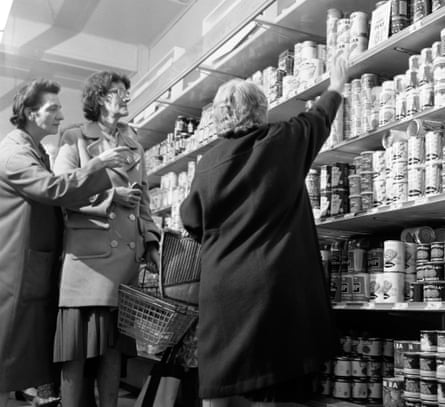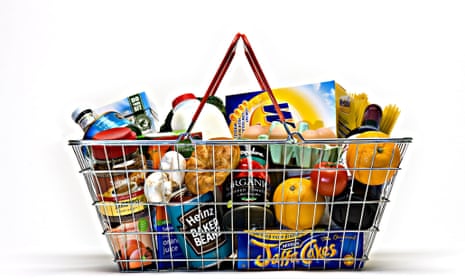Do you remember when you stopped buying chicken kievs? Or when you started buying cereal bars? While we might have an eye on the cost of things in our baskets, few of us stop to consider how what we buy has changed over the past seven decades. But change it has. In 1947, the Office of National Statistics began recording the prices of an average basket of the everyday items consumers might buy, to help calculate a key measure of inflation, the consumer price index. On that first list were items such as wild rabbit, tins of corned beef and condensed milk, things few of us buy today.
Each year, the list is updated and new products are added, while others are quietly dropped. Looking at these imaginary shopping baskets over the past 70-odd years reveals the changing shopping and eating habits of postwar Britain - the products we have always adored, and those we left behind. What’s driven this are massive social and technological developments that changed what we ate, and how we shopped.
Items that make it into the basket have to achieve significant volume in sales, and prove they are not a flash-in-the-pan product (which is why pop tarts or micro chips have never made it in). Or they help to balance the basket: the ONS is after products that represent a particular section of the store and the weekly shop, so blueberries were added in 2013 to help balance out the price volatility of the fresh fruit sector.
Some items, such as vegetables, fresh meat and tea, are ever present, but many other products drift in and out, and change name. In 2012, “soft continental cheese” was added because the dairy sector was under-represented. Brie had previously been listed but was removed in 2006; 2009 saw Parmesan cheese added, 10 years after the boom of late-90s “Britalian”. This marks the point when the sick-smelling yellow dust that came in a cardboard tub that we had endured in the 1980s was finally replaced by the fresh version, and Parmesan had moved from deli specialty to supermarket everyday item all over Britain.

It is also worth noting just how much the list has grown in size over the past 50 years. In 1947, the food section contained a mere 65 items. In 2014, it swelled to 154 with the introduction of such things as vegetarian burgers, pre-packed salads, fresh fruit snacking pots, chewing gum, energy drinks, smoothies, chicken nuggets and doughnuts. You can see the 2014 list here. Below are some of the sections that have seen fluctuations and changes over the years.
Cans
In the 1940s, hardly anybody owned a fridge, so tinned food was enormously popular, explaining the presence of canned fish and condensed milk. Baked beans appeared in the first basket alongside other tinned ingredients such as peas. By 1976, canned tomatoes are there, and plenty of canned fruit. But by 2009, the only cans on the list are tomatoes, sweetcorn and baked beans, marking the humble can’s fall from grace.
Tea
Unsurprisingly, given that this is Britain, tea appears in every basket in one form or another. Initially tea meant loose-leaf tea, which was only joined by tea bags in 1980. in 2002, loose-leaf was removed, reflecting a decline in sales. Herbal and fruit teas were added in 2001, but just for one year. By 2003, there were only plain old tea bags left.
Corned beef
Corned beef in cans was present in the first basket and by 1980 appeared as two distinct versions, sliced and canned. By 1993, it was gone, replaced by the suspicious sounding “canned meat”. This reflects the change from tinned and potted meats to items such as pâtés, pies and charcuterie. Indeed, in 2013, charcuterie was added to the basket, forever replacing the can of corned beef.
Breakfast cereals
Breakfast cereals first entered the basket in 1952. In 1987, oats as a separate ingredient came out, to be replaced by muesli, perhaps reflecting the 80s obsession with the stuff; it was quietly dropped in 2006. In 2001, cereal snacks appeared, changing to cereal bars in 2010. In 2012, “hot oat instant cereal” was added, reflecting the fact that many of us are now eating breakfast at our desks.
White sliced loaf
Another staple that has been in the basket from the beginning. In 1962, “sliced and unsliced” was added, along with brown bread, which came out in 2006 - so much for the noughties health kick. Pitta breads went in in 2000, only to come out in 2010 and be replaced by garlic bread – you know, the frozen industrial kind. In 2001, baguettes were added, only to come out four years later.
Milk and yoghurt
Yoghurt first appeared in the 1974 basket, joined by fromage frais in 1993, flavoured milk in 1997 and chilled pot dessert in 2001. In 2003, baby milk formula and, in 2008, pro-biotic drink were added. Losses in the dairy section over the years include UHT milk, TT (Tuberculin Tested) milk and reduced-cost welfare milk.
Potato products
Invented in the 1960s, Smash appeared in 1974 basket due to a huge increase in sales driven by the famous adverts featuring Martian puppets. Smash was still in there in 1980, but by 1987 it was replaced with frozen oven chips.
As for what’s new in 2015’s basket, and what has been dropped, we will have to wait until March to find out. What would you put in there? And what have you loved and lost?
The Inflating Shopping Basket is on BBC Radio 4 on Sunday 18 January, 1.30pm-2pm.





Comments (…)
Sign in or create your Guardian account to join the discussion